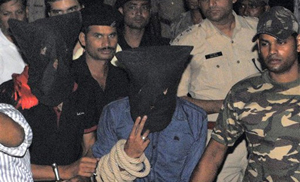 Patna, Aug 30: A few hours before he was flown from Patna to New Delhi in a special Border Security Force (BSF) flight on Friday, the co-founder of Indian Mujahideen (IM) Yasin Bhatkal told his interrogators that his fight was against the system and therefore he had taken the extreme step to bomb and destroy set-ups.
Patna, Aug 30: A few hours before he was flown from Patna to New Delhi in a special Border Security Force (BSF) flight on Friday, the co-founder of Indian Mujahideen (IM) Yasin Bhatkal told his interrogators that his fight was against the system and therefore he had taken the extreme step to bomb and destroy set-ups.
“Hamein iss system se pareshani hai. Iss liye purey system ko bigadna chahte hain. (My problem is with this system, and that’s why I want to destroy it),” said Bhatkal while confessing about his involvement in about 40 blasts in different states in the last seven years.
Bhatkal, who was brought to Patna on Thursday at midnight, amid tight security, was kept on Bihar Military Police-5 (BMP) campus, where the state police and the sleuths of
National Investigation Agency (NIA) quizzed him on Friday morning about his role in
several bomb explosions and his modus operandi.
Bhatkal, who spoke fluently in English and Hindi, told the police that he posed as an Unani doctor at Birganj in Nepal (where he had his hideout). And when he would visit India, he would tell the Indian cops that he was an engineer working on irrigation projects in Nepal.
When the NIA team, led by one of its brightest IPS officers Vikas Vaibhav, asked him why he carried out series of blasts and killed hundreds of innocent people, he showed no sign of remorse.
Without batting an eyelid, he said, “Yeh toh hota rehta hai. Isme nayi baat kya hai (These things keep on happening. What’s new about it)?”
He, however, showed repentance over the killing of innocent children in the blasts.
The IM co-founder, in the meantime, denied his involvement in the Bodh Gaya serial blast case this July. Since there was no case pending against him here in the state, Bihar did not seek his remand. Eventually, he was flown to New Delhi on Friday morning since the NIA had procured a non-bailable warrant against him and the Motihari Chief Judicial Magistrate, SP Shukla, had allowed his three-day transit remand.






Comments
Add new comment